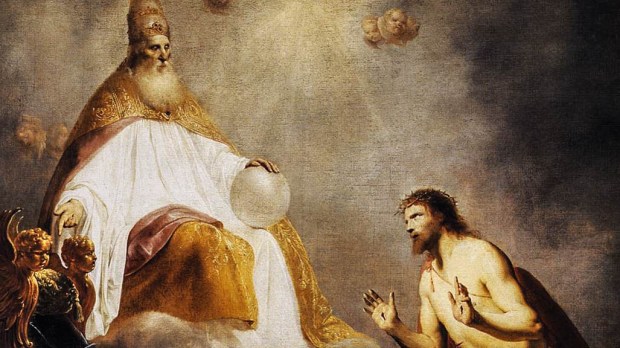Lenten Campaign 2025
This content is free of charge, as are all our articles.
Support us with a donation that is tax-deductible and enable us to continue to reach millions of readers.
I love how, early on, the Catechism of the Catholic Church reveals God’s “innermost secret.” It’s this: God is love. The readings for the Sixth Sunday of Easter, Year B explain in detail just what that means.
1: God loves us totally. He holds nothing back.
You and I may be one person at home, one person at work, and yet another with our friends. We hold something back from each.
Not Jesus Christ. In the Gospel, Jesus says, “As the Father loves me, so I also love you.”
In the inner life of the Trinity, God the Son loves God the Father totally and is loved by God the Father completely in return. In his life on earth, he is the same way. He loves us all, fully and completely — and longs for our love back.
“In truth, I see that God shows no partiality,” as Peter puts it in the first reading. Love is all there is in the Divine simplicity of God.
2: God wants only our happiness.
We usually forget that “God is love.” Then we get the commandments all wrong. We think of God as a policeman who wants to catch us doing wrong, or as a cheerleader who applauds us no matter what.
Not at all. He is all love, and his commandments are as serious as a father telling his daughter not to play in the street.
Jesus says in the Gospel, “If you keep my commandments you will remain in my love.” If you don’t, you won’t.
3: Love is something we can choose — or not.
Jesus says in the Gospel, “This is my commandment: Love one another as I love you.”
The implications of that are enormous.
First, it means you can be commanded to love. That means love is a matter of the will; it is something we choose or reject, not something we “fall into” or not. Real love is shown by actions, not emotions.
Second, it means God wants us to imitate his total love for others.
He loved us by leaving his personal and comfortable realm in heaven to enter space and time and to suffer for us. He wants us to love others that way — by stepping away from our personal concerns and serving those around us.
4: To love the way we should takes everything we have.
That commandment to love like God requires a very significant response. Jesus says, “No one has greater love than this, to lay down one’s life for one’s friends.”
Again, this is how Jesus loves, and he expects the same. We have to be willing to give our lives for others — in dying or in living. We do it by spending our time and our major decisions on others — our family, first of all, but then on those around us. This is only possible because:
5: God, the all-powerful, wants to be your friend.
In a master-slave relationship, we need to do the bidding of the master or suffer the consequences.
But “I no longer call you slaves, because a slave does not know what his master is doing,” says Jesus, “I have called you friends.”
That’s an enormous change. When you serve a friend, your motivation is love and the friend helps you complete the task. In fact:
6: God is the best kind of friend: He is also family.
“It was not you who chose me, but I chose you and appointed you to go and bear fruit that will remain,” says Jesus.
We do not choose to love our mother or father first; they love us first. We didn’t earn their love; we were created in it, by it, and for it. It is the same with God. We may seek him out, but when we find him we discover that he never left us.
As John puts it in the Second Reading, what saves us is “not that we have loved God, but that he loved us.”
7: God wants to hear from us. All the time.
“Whatever you ask the Father in my name he may give you,” says Jesus.
Loving God means talking to him — asking, thanking, and praising — in words of love. “Prayer is a vital necessity,” says the Catechism. “Prayer and Christian life are inseparable.”
So our job is to follow his loving direction and talk to him.
What do we get in return? God is giving everything to us all the time; pouring out his gifts. They include everything we see, taste, touch or feel — and our very existence.
That’s not a bad tradeoff. It’s the kind you only get from love.

Read more:
What does the Bible say about refugees?

